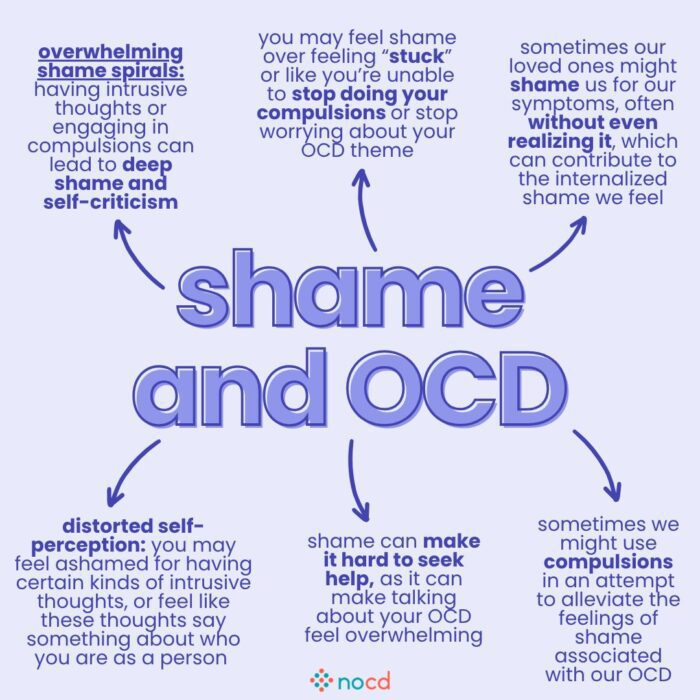As a therapist who regularly works with people who have obsessive-compulsive disorder (OCD), there are two words that are often at the forefront of their minds: guilt and shame. Guilt is a feeling of remorse when you believe you’ve done something wrong. Shame is when you internalize that you are a “bad” person or have a sense of humiliation about yourself. Let’s explore why guilt and shame often go hand-in-hand with OCD, and how to free yourself from these feelings.
Does OCD cause guilt and shame?
It’s hard to know whether OCD triggers feelings of excessive guilt and shame, or whether these feelings are already present and OCD takes hold of them, making them more troublesome.
But what is clear is that OCD causes intrusive thoughts—which are unwanted, disturbing thoughts that appear against your will—and these are often about taboo subjects, ranging from harming others to engaging in illicit sexual acts. So it’s easy to see how intrusive thoughts can contribute to guilt and shame. (This happens even though people with OCD are unlikely to ever act on their intrusive thoughts).
Some research even suggests that people with OCD experience “guilt sensitivity,” meaning that you may have a higher aversion to feelings of guilt—much like you do with distress and anxiety. You may feel like you cannot tolerate it. Likewise, when shame takes hold, it can also reach an intense level where you feel like something is wrong with you on a core level.
One focal point for your shame is compulsive behaviors. Compulsive behaviors are repetitive actions that are performed in an attempt to relieve anxiety caused by obsessions or intrusive thoughts. You might feel self-loathing for not being able to stop engaging in these compulsions and may withdraw from others to try to conceal what you’re doing.
How to overcome OCD shame and guilt
Many of the people that I have treated have lived years believing the lie that no one is like them and no one would ever understand what they are going through. They think they’re damaged, or that they are fundamentally bad people. This couldn’t be further from the truth.
One of the first things that I tell members when I meet them is that nothing they share with me will shock or surprise me, and it definitely won’t cause me to make negative judgments about them. I truly mean this: Therapists who are trained in OCD know that the thoughts, feelings, images, and urges someone has are not indicative of who a person is, and they reveal nothing about their true desires. In fact, it’s often quite the opposite—the nature of their thoughts often goes directly against what they value and cherish most.
I also tell my members that shame thrives on secrecy. We must not keep our shame hidden; if we do, it will fester in the silence. There can be a tremendous benefit to voicing your intrusive and shameful thoughts or feelings. When you say them out loud, you can take away their power.
Once you’re ready to open up about your OCD struggles, you can get on the appropriate treatment path to healing your OCD and—as a byproduct—recover from the shame and guilt you feel about it.
So what is the best treatment for OCD?
The most successful treatment for OCD is a form of behavioral therapy called exposure and response prevention (ERP). Unlike traditional talk therapy, which can backfire and make OCD worse, ERP—which was developed specifically to treat OCD—is clinically proven to be highly effective in the majority of people.
Here’s how it works: A trained therapist who specializes in OCD will take the time to understand your symptoms and create a custom ERP therapy plan specifically for you. Then, you’ll work together to rank your fears or triggers based on how stressful they seem. To begin with, your therapist will typically prompt you to face a fear that brings on only a mild amount of distress. For example, your therapist might simply show you a photo of a room where things aren’t lined up perfectly. The fear thoughts—like the idea that something terrible will happen when things in your environment aren’t perfectly symmetrical—will likely come up, but instead of responding with a compulsion, you’ll learn to tolerate the discomfort. By making this conscious choice and seeing that nothing bad occurs, or realizing that you handled the discomfort better than you thought you could, your brain gets the message that there was nothing to fear in the first place.
As your therapy progresses, you’ll tackle triggers that elicit a bit more distress, to conquer bigger fears. With an ERP therapist guiding you, you’ll practice confronting your fears in your everyday life, too, instead of just the controlled setting of therapy.
Most of the time something amazing happens as a result of this therapy: You won’t be riddled with distress from intrusive thoughts, images, or urges. Your need to engage in compulsions goes away. And the things that matter the most to you won’t be at risk of slipping away. For instance, when you spend time with a loved one, you’ll be able to focus on the connection between the two of you—rather than on whether the salt and pepper shaker on the table are in a perfectly straight line. In essence, you’ll get to live a life that’s free from the grip of OCD.
Working with an OCD specialist to address the thoughts and situations that cause you distress is more accessible than ever thanks to virtual ERP therapy. In fact, peer reviewed research shows live teletherapy sessions of ERP can be more effective, delivering results in less time than traditional outpatient ERP therapy, often in as little as 12 weeks.
Want to begin your ERP therapist search? We encourage you to browse the NOCD Therapist Directory. Every NOCD therapist is not only specialized in ERP but trained to deliver treatment online. Choose your therapist and we do the rest, including helping with scheduling and payment. Of course, if NOCD Therapists aren’t the right fit, you can also explore the International OCD Foundation Therapist Directory.


